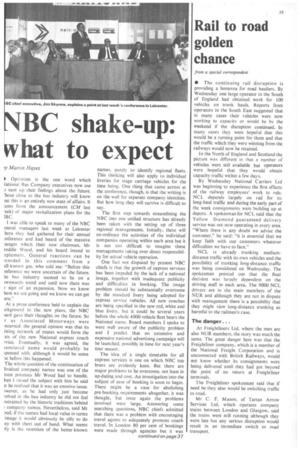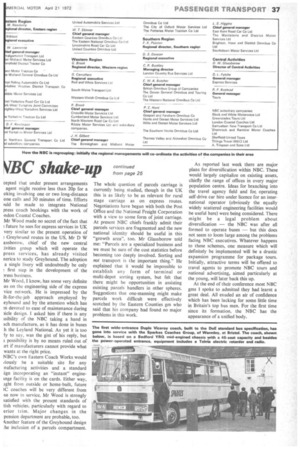BC shake-up: hat to expect
Page 27

Page 35

If you've noticed an error in this article please click here to report it so we can fix it.
9, Martin Hayes Optimism is the one word which 4.ational Bus Company executives now use 3 sum up their feelings about the future. 'hose close to the bus industry will know -tat this is an entirely new state of affairs. It terns from the announcement (CM last reek) of major revitalization plans for the IBC.
I was able to speak to many of the NBC eneral managers last week at Leicester 'here they' had gathered for their annual )nference and had heard of the massive langes which their new chairman, Mr reddie Wood, and his board intend to nplement. General reactions can be :corded in this comment from a ell-known gm, who told me: "Before this niference we were uncertain of the future. he bus industry seemed to be on a iwnwards trend and until now there was ) sign of an expansion. Now we know here we are going and we know we can get ere."
At a press conference held to explain the ickground to the new plans, the NBC yard gave their thoughts on the future. So r as Associated Motorways were incerned. the general opinion was that its isting network of routes would form the .sis of the new National express coach rvice. Eventually, it was agreed, the ssociated name would probably be ;pensed with. although it would be some le before this happened.
The whole question of the continuation of iividual company names was one of the ttest potatoes Mr Wood had to handle. hen I raised the subject with him he said it he realized that it was an emotive iusue. )wever. as he had only just become rolved in the bus industry he did not feel astrained by the historic traditions behind company names. Nevertheless, said Mr Jod, if the names had local value in terms image it would obviously be silly to do ay with them out of hand. What seems Ay is the retention of the better-known
names, purely to. identify regional fleets. This thinking will also apply to individual liveries for stage carriage vehicles for the time being. One thing that came across at the conference, though, is that the writing is on the wall for separate company identities. But how long they will survive is difficult to say.
The first step towards streamlining the NBC into one unified structure has already been taken with the setting up of three regional managements. Initially, these will co-ordinate the activities of the individual companies operating within each area but it is not too difficult to imagine these managements taking over direct responsibility for actual vehicle operation.
One fact not disputed by present NBC chiefs is that the growth of express services has been impeded by the lack of a national image. together with inadequate publicity and difficulties in booking. The image problem should be substantially overcome by the standard livery being adopted for express service vehicles. All new coaches are being specified in the new red, white and blue livery, but it could be several years before the whole 4000-vehicle fleet bears the National name. Board members I spoke to were well aware of the publicity problem and I predict that an 'extensive and expensive national advertising campaign will be launched, possibly in time for next year's tour season.
The idea of a single timetable for all express services is one on which NBC top brass are evidently keen. But there are major problems to be overcome, not least in up-dating and cost. An investigation into the subject of ease of booking is soon to begin. There might be a case for abolishing pre-booking requirements altogether, it was thought, but once again the problems involved were large. Answering some searching questions, NBC chiefs admitted that there was a problem with encouraging travel agents to adequately promote coach travel. In London 80 per cent of bookings were made through agencies but it was cepted that under present arrangements agent might receive less than 20p for a oking involving one or two long-distance one calls and 30 minutes of time. Efforts ould be made to integrate National press coach bookings with the work of .ndon Coastal Coaches.
Mr Wood made no secret of the fact that future he sees for express services in UK very similar to the present operation of Greyhound routes in the US, Mr D W assborow, chief of the new central ivities group which will operate the press services, has already visited nerica to study Greyhound. The adoption a single livery will undoubtedly be only first step in the development of the ress business.
Mr Wood, I know, has some very definite as on the engineering side of the express vice network. He is impressed by the ilt-for-thc-job approach employed by eyhound and by the attention which has m devoted to ease of maintenance during idle design. I asked him if there is any isibility of the NBC taking a hand in ich manufacture, as it has done in buses h the Leyland National. As yet it is too ly to say, was the gist of his reply, but
possibility is by no means ruled out of Irt if manufacturers cannot provide what wants at the right price.
NBC's own Eastern Coach Works would riously he a suitable site for any nufacturing activities and a standard ,ign incorporating an "instant" engineInge facility is on the cards. Either way, irght from outside or home-built, future lC coaches will be very different from se now in service. Mr Wood is strongly satisfied with the present standards of tish vehicles, particularly with regard to erior trim. Major changes in the pension department are probable, too. knother feature of the Greyhound design he inclusion of a parcels compartment.
The whole question of parcels carriage is currently being studied, though in the UK this is as likely to be as relevant for rural stage carriage as on express routes. Negotiations have begun with both the Post Office and the National Freight Corporation with a view to some form of joint carriage. At present NBC chiefs frankly admit their parcels services are fragmented and the new national identity should be useful in this "growth area", too. Mr Glassborow told me: "Parcels are a specialized business and we must be sure of the cost statistics before becoming too deeply involved. Sorting and not transport is the important thing." He explained that it would be impossible to establish any form of terminal or multi-depot sorting system, but felt that there might be opportunities in assisting existing parcels handlers in other spheres. Suggestions that one-manning might make parcels work difficult were effectively scotched by the Eastern Counties gm who said that his company had found no major problems in this work.
As reported last week there are major plans for diversification within NBC. These would largely capitalize on existing assets, chiefly the range of offices in every major population centre. Ideas for branching into the travel agency field and for, operating self-drive car hire under licence for an international operator (obviously the equally widely scattered engineering facilities would be useful here) were being considered. There might be a legal problem about diversification — the NBC was after all formed to operate buses — but this does not seem to loom large among the problems facing NBC executives. Whatever happens to these schemes, one measure which will definitely be implemented will be a drastic expansion programme for package tours. Initially, attractive terms will be offered to travel agents to promote NBC tours and national advertising, aimed particularly at the young, will later back this up.
At the end of their conference most NBC gms I spoke to admitted they had learnt a great deal. All exuded in air of confidence which has been lacking for some little time in Britain's top bus men. For the first time since its formation, the NBC has the appearance of a unified body.












































































































